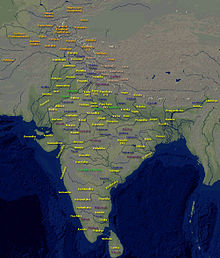| Revision as of 01:20, 6 March 2010 editShreevatsa (talk | contribs)Extended confirmed users, Pending changes reviewers, Rollbackers12,372 editsm Undid revision 348016531 by 67.117.24.83 (talk) ?← Previous edit | Revision as of 02:36, 13 June 2011 edit undoKtr101 (talk | contribs)104,342 edits no one has furthered the merge argument since it was proposed so i'm removing the tagNext edit → | ||
| Line 1: | Line 1: | ||
| ] | ] | ||
| {{mergeto|Nishada Kingdom|date=March 2008}} | |||
| '''Nishadha''' (]: निशाद''{{IAST|niṣāda}}'') was an indigenous tribe inhabiting ], according to sources in ]. The Nishadha people have been described in ] and ]. | '''Nishadha''' (]: निशाद''{{IAST|niṣāda}}'') was an indigenous tribe inhabiting ], according to sources in ]. The Nishadha people have been described in ] and ]. | ||
Revision as of 02:36, 13 June 2011

Nishadha (Sanskrit: निशादniṣāda) was an indigenous tribe inhabiting ancient India, according to sources in Hindu mythology. The Nishadha people have been described in Ramayana and Mahabharata.
Description in Ramayana
The main profession of Nishaadas was hunting birds. When a Nishaada had killed one bird from a pair, the other bird was crying, and that inspired Valmiki to write the story of Rama and Sita known as the Ramayana. In Ramayana, the king of Nishaadas, named Guha, was a very close friend of Rama. He helps Rama and Sita to cross Ganges river.
Description in Mahabharata
The Mahabharata speaks of Nishaada (or Shabara) as forest hunters.
Music
In Indian music, Nishada is the seventh note (swara) of the octave.
See also
References
- Ramayana by Valmiki, Gita Press publication, Gorakhpur, India
- The Cultural Process in India by Irawati Karve, Vol. 51, Oct., 1951 (Oct., 1951), pp. 135-138
| Hindu deities and texts | ||
|---|---|---|
| Gods |  | |
| Goddesses | ||
| Other deities | ||
| Texts (list) | ||
This Hindu mythology–related article is a stub. You can help Misplaced Pages by expanding it. |